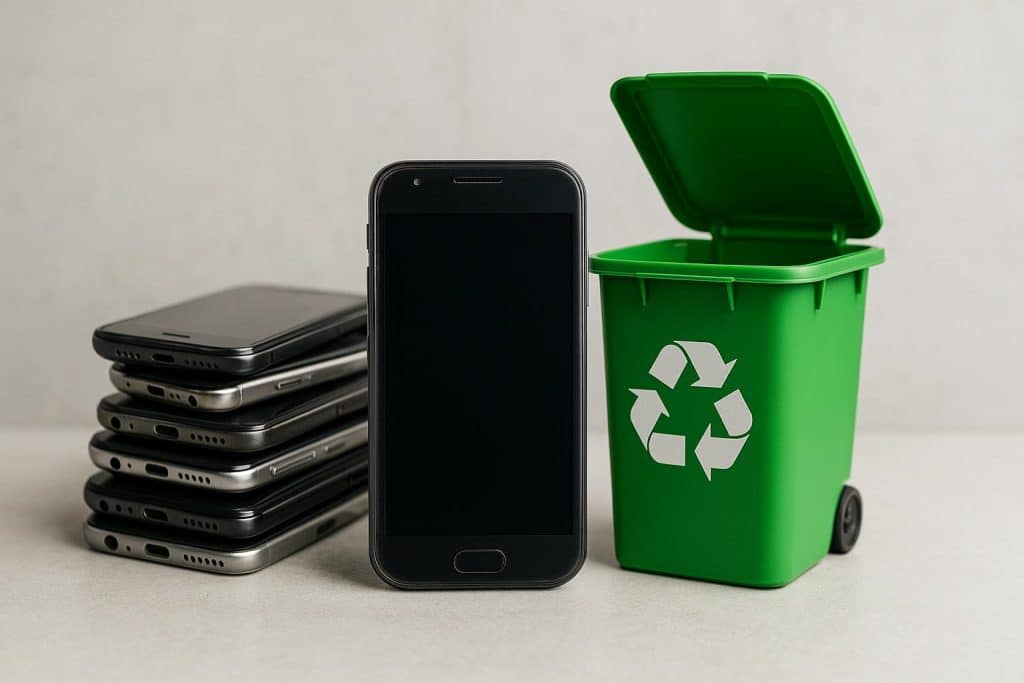Cell phone recycling is one of the most overlooked yet impactful ways individuals can contribute to environmental sustainability. In a world increasingly dependent on technology, mobile phones are replaced more frequently than ever, often without consideration for their disposal. With millions of devices discarded each year, it’s essential to understand why proper recycling matters and how it can benefit both the planet and society.
The urgent need for cell phone recycling
The rapid advancement of mobile technology has led to shorter device lifespans and a significant increase in electronic waste. Globally, over 60 million tonnes of e-waste are generated annually, and this number is growing at an alarming rate. A considerable portion of this includes old mobile phones, many of which end up in landfills instead of being properly recycled. Despite the fact that almost 100% of the materials in a cell phone can be recycled, only about 15% actually are in countries like the United States.
This low recycling rate is not just a missed opportunity—it poses a major environmental and health hazard. Old phones contain harmful substances like lead, mercury, and cadmium. When dumped into landfills, these toxins can leach into the soil and water, threatening ecosystems and human health. Proper cell phone recycling ensures that these hazardous materials are safely handled and that valuable components are recovered for reuse.
The value inside every old device
Cell phones may seem small, but they’re packed with precious and rare materials. Each device contains a mix of metals, plastics, and glass that can be extracted and reused. For instance, one million recycled cell phones can yield about 75 pounds of gold, 772 pounds of silver, 35,000 pounds of copper, and 33 pounds of palladium. These are not just economic assets—they’re critical to the production of new technology.
Recycling cell phones reduces the need to mine new materials, which is both environmentally damaging and energy-intensive. Mining operations often destroy habitats, pollute water sources, and emit significant amounts of greenhouse gases. By choosing cell phone recycling, we help conserve natural resources and lower the carbon footprint of electronics manufacturing.
Health and environmental benefits
The benefits of cell phone recycling extend far beyond materials recovery. When devices are improperly disposed of—especially in developing countries where informal recycling is common—workers and nearby communities are exposed to hazardous chemicals. These substances can cause serious health issues, including respiratory problems, neurological damage, and even cancer.
Environmentally, the improper disposal of cell phones contributes to the degradation of land and water systems. Toxic substances seep into the ground and can persist in ecosystems for years, affecting plants, animals, and ultimately humans. Recycling ensures these risks are minimized through regulated processes that meet strict environmental and safety standards.
A booming industry with global momentum
The cell phone recycling industry is gaining traction worldwide, driven by growing awareness of e-waste and increased demand for sustainable practices. In 2024, the global mobile phone recycling market was estimated to be worth over $8 billion, and it’s expected to more than double by 2031. This rapid growth reflects a broader shift toward a circular economy, where products are reused, repurposed, or recycled instead of discarded.
Government agencies and private companies alike are stepping up efforts to make cell phone recycling more accessible. In the United States, new federal initiatives are funding drop-off sites at retail locations across the country, making it easier for consumers to recycle responsibly. Meanwhile, several major tech companies have introduced trade-in and take-back programs to encourage recycling of old devices.
Real-world examples of circular solutions
Successful recycling programs are already showing how a circular approach to electronics can work. In Germany, telecom provider Vodafone partnered with a recycling firm to implement a “One for One” system. For every new phone sold, an old one is collected and refurbished or responsibly recycled. This initiative not only promotes sustainability but also helps close the loop on resource consumption.
In the United States, several recycling firms have adopted zero-landfill policies, ensuring that no part of a collected device ends up as waste. These companies focus on secure data wiping, parts harvesting, and the resale of functioning units. Refurbished phones are sold in secondary markets or donated to those in need, extending their useful life and reducing demand for new devices.
The role of consumers in cell phone recycling
Consumers play a vital role in the success of cell phone recycling efforts. Every old phone sitting in a drawer is a resource waiting to be recovered. Yet, millions of Americans keep unused phones at home due to data privacy concerns or simply not knowing where to recycle them. Fortunately, most recycling programs today offer secure data erasure, and manufacturers often provide detailed instructions for safely wiping personal information.
Participating in cell phone recycling is easier than ever. Retailers like phone carriers, electronics stores, and even office supply chains now offer drop-off bins or mail-in services. Charities also accept used phones to support various causes, from domestic violence shelters to environmental programs. Taking a few minutes to recycle an old device can have long-lasting positive effects.
A small action with global impact
Cell phone recycling may seem like a small action, but when multiplied by millions of users, its impact becomes profound. It conserves valuable materials, reduces the strain on natural resources, minimizes environmental damage, and prevents harmful toxins from entering our ecosystems. It also supports the global shift toward sustainability and responsible consumption.
With the rise of electronic waste showing no signs of slowing, the need for responsible recycling is more urgent than ever. Whether you’re upgrading your device, cleaning out a drawer, or simply looking to do your part for the planet, recycling your old cell phone is a powerful step in the right direction. By embracing cell phone recycling, we each contribute to a cleaner, safer, and more sustainable future.
